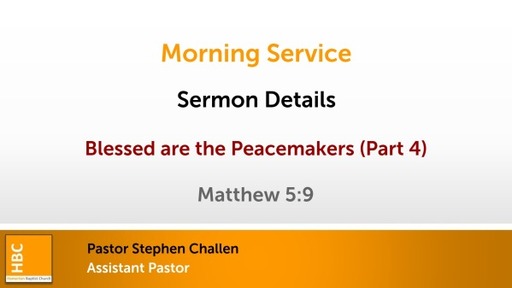Blessed are the peacemakers (Part 4)

Morning 12 november 23
Order of Service
Welcome
Hymn - Lord, for the years your love has kept and guided (951)
Psalm Reading
Prayer
Remembrance Day: 10:50
Hymn -
Teen Talk
Hymn -
Notices
Main Prayer
Birthdays
Prayer Items
Hymn - O HOW GOOD IT IS (1264)
Sermon Search
Reading
Sermon
The Message and The Ministry
Writing about the work of the preacher, the well-known Methodist minister W E Sangster, who died in 1960, said this: ‘It is the sheer work of the herald who goes in the name of the King to the people who, either openly or by their indifference, deny their allegiance to their rightful Lord. He blows the trumpet and demands to be heard. He tells the people in plain words of the melting clemency of their offended King and the things that belong to their peace.’
In Michael Green’s words, ‘There is no hint among ancient records that the early church saw evangelism as the task of the leadership alone. It was too good to leave to the professionals.’
There is no greater means of bringing peace than by spreading the gospel, the good news that ‘God was in Christ reconciling the world unto himself’
Family Likeness
In J C Ryle’s words, ‘They are doing the very work which the Son of God began when he came to earth for the first time and which he will finish when he returns for the second time.’
R V G Tasker puts it, ‘The peacemakers are those who are at peace with God … and who show that they are truly children of God by striving to use every opportunity open to them to effect reconciliation between others who are at variance.’
Puritan preacher Richard Baxter went so far as to say, ‘He that is not a son of peace is not a son of God’
Manifestation
‘There is a light which comes and overpowers a man’s soul and assures him that God is his, and he is God’s, and that God loves him from everlasting … It is a light beyond the light of ordinary faith … the next thing to heaven; you have no more, you can have no more, till you reach there … It is faith elevated and raised up above its ordinary rate, it is electing love of God brought home to the soul.’
The Biblical Museum tells of a Birmingham man by the name of Dickinson who was commonly known as ‘the peacemaker’ and of whom this was said: ‘Such was his anxiety to keep the bonds of peace from being broken, such was his solicitude to heal the breach when made, that he would stoop to any act but that of meanness, make any sacrifice but that of principle, and endure any mode of treatment, not excepting even insult and reproach. From the high estimate in which his character was held, he was often called upon to act as umpire in cases of arbitration; and it was rarely, if ever, that the equity of his decisions was impeached.’
C Ryle offers excellent advice: ‘Those who try to do good must look forward to the Day of Judgement with patience. They must be content in this present world to be misunderstood, misrepresented, vilified, slandered and abused. They must not cease to work because their motives are mistaken and their characters are fiercely assailed. They must remember that all will be set right at the last day. The secrets of all hearts will then be revealed. The purity of their intentions, the wisdom of their labours and the rightfulness of their cause shall at length be manifest to all the world.’
